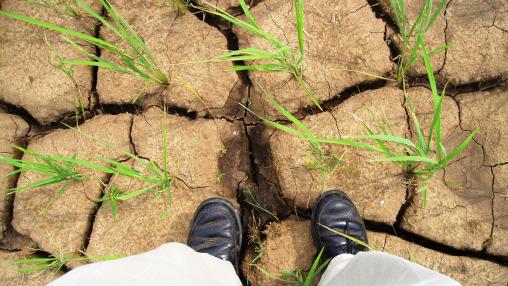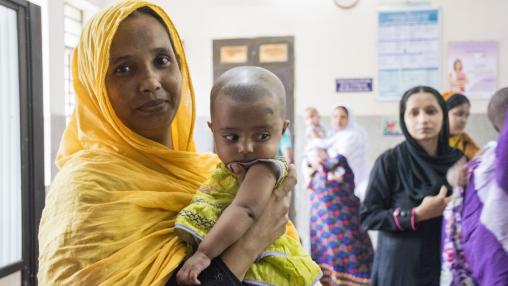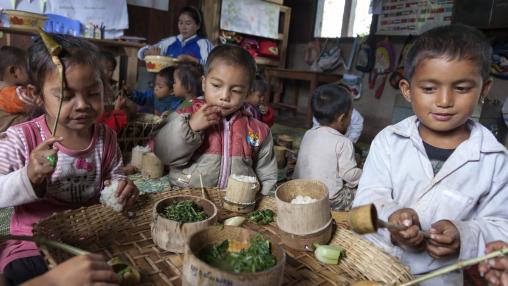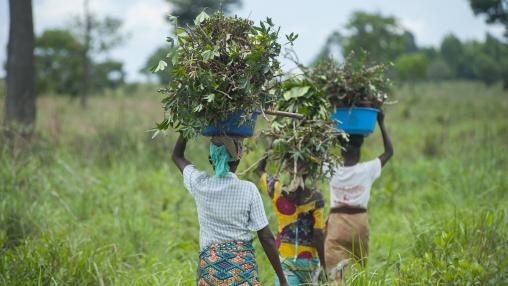CGIAR Knowledge and Innovation to end hunger by 2030
“CGIAR Knowledge and Innovation to End Hunger by 2030 - Transforming food, land and water systems to ensure food and nutrition security in a climate crisis,” is a virtual event that will highlight CGIAR’s climate-focused Initiatives and help jumpstart the creation and development of new Agriculture Innovation Mission for Climate (AIM4C) Innovation Sprints, highlighting examples of work that can be scaled up with more partnerships/funding.
Find the agenda here.

IFPRI Global Food Policy Report 2022: Accelerating food systems transformation to combat climate change
In 2021, the United Nations Intergovernmental Panel on Climate Change sounded the alarm on a looming crisis: Climate change is generating a “code red for humanity” that requires urgent action. Food systems are deeply entwined with this crisis. In many regions, especially in the developing world, climate change has already started to reduce agricultural productivity and disrupt supply chains, putting pressure on livelihoods and threatening to significantly increase hunger and malnutrition, making adaptation efforts crucially important.
Global Launch Event - Fruit and Vegetables for Sustainable Healthy Diets (FRESH)
Poor diets are a primary cause of malnutrition and the leading cause of disease worldwide. Improving diets, including increasing fruit and vegetable intake, could save one in five lives lost annually. This change must begin with consumers, by understanding dietary patterns and finding cost-effective ways to make diets rich in fruit and vegetables more desirable, accessible, affordable, and available.
COVID-19 & Global Food Security: 2 Years Later
This e-book builds upon the lessons presented in the earlier volume, COVID-19 & Global Food Security (2020) that documented the impacts of the COVID-19 pandemic as of mid-2020, particularly the disruptions to livelihoods and the food and nutrition security of billions of people. Early in the pandemic, many hoped that COVID-19 could be controlled and even eliminated through a short-term response phase and that attention could subsequently be shifted to recovery and resilience building.
Using Big Data and Machine Learning to Predict Poverty and Malnutrition for Targeting, Mapping, Monitoring, and Early Warning
Increasingly plentiful data and powerful predictive algorithms have heightened the promise of data science for humanitarian and development programming. As agencies increasingly embrace and invest in machine learning methods for poverty and malnutrition targeting, mapping, monitoring, and early warning, it is essential to recognize that different objectives require distinct data and methods.

Public Health Experts Take On UN’s Zero Hunger Challenge
A new initiative, the Community for Zero Hunger, was launched this week. It will identify the greatest gaps that remain in reducing hunger and malnutrition, and leverage the private sector to help fill those gaps at scale.

Global Nutrition Report: From Promise to Impact: Ending Malnutrition by 2030
The 2016 Global Nutrition Report (GNR) , released today in Washington DC, provides an independent and annual review of the state of the world’s nutrition. The report, now in its third year, focuses on the progress made toward recent nutrition-related global commitments and identifies opportunities for action to end malnutrition in all its forms by 2030.

Combating the triple-threat of malnutrition demands political will, quality data, and targeted policy
Among children under the age of five around the world, 161 million are stunted, 51 million are wasted, and 42 million are obese, according to the 2015 Global Nutrition Report released today by the International Food Policy Research Institute (IFPRI) in Washington, DC. The report illustrates that malnutrition takes many forms and affects every country on earth. Whereas some solutions for reducing malnutrition are promising, it does not take the same form nor demand the same policy solutions in every country or context.

G7 commits to lifting 500 million people out of hunger and malnutrition by 2030
The G7 Summit closed this afternoon in Krün, Germany, and the leaders announced their commitment to continue and build upon a wide range of interventions for food security and nutrition. As part of a broad effort involving partner countries and international actors, the G7 aims to lift 500 million people in developing countries out of hunger and malnutrition by 2030.

IFPRI Report: Middle Income Countries Play Key Role in Eliminating Hunger and Malnutrition
The food security and nutrition situation in middle income countries is one of seven food policy issues examined in this year’s Global Food Policy Report, an annual IFPRI flagship publication that examines major food, agriculture, and nutrition developments and trends with a view toward reducing poverty around the globe.
Brazil, China, India, Indonesia, and Mexico may be rising economic powerhouses, but these five fast-growing, middle income countries are still home to nearly half of the world’s hungry, or 363 million people.